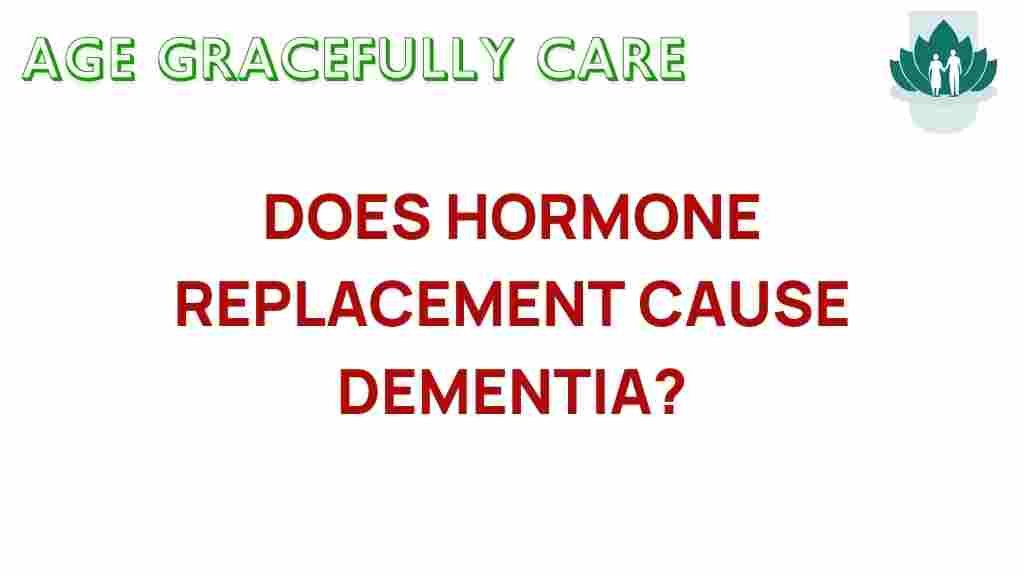Unraveling the Mystery: Does Hormone Replacement Therapy Lead to Dementia?
As women age, particularly during and after menopause, many experience a variety of physical and emotional changes. Among the most discussed treatments for alleviating menopausal symptoms is hormone replacement therapy (HRT). While HRT can provide relief from symptoms such as hot flashes and mood swings, there has been an ongoing debate regarding its impact on cognitive health and the potential link to dementia. This article aims to unravel the mystery surrounding hormone replacement therapy and its implications for women’s health, especially concerning cognitive health and neurodegenerative diseases.
Understanding Hormone Replacement Therapy
Hormone replacement therapy involves the administration of hormones to alleviate symptoms caused by hormonal imbalances, particularly during menopause when estrogen and progesterone levels significantly decline. HRT can be administered in various forms, including pills, patches, gels, and injections. The primary goal of HRT is to restore hormonal balance and improve quality of life for women experiencing menopause.
The Connection Between Hormones and Cognitive Health
Research indicates that hormones, particularly estrogen, play a crucial role in maintaining cognitive health. Estrogen has been found to have neuroprotective effects, promoting the survival of neurons and enhancing synaptic function. During menopause, the decline in estrogen levels may contribute to cognitive decline, making it essential to explore whether hormone replacement therapy can mitigate these effects.
Potential Risks and Benefits of HRT
While HRT may offer relief from menopausal symptoms and potentially protect cognitive health, it is not without risks. Understanding these can help women make informed decisions regarding their health.
- Benefits of HRT:
- Alleviation of menopausal symptoms
- Improved mood and emotional well-being
- Potential reduction in osteoporosis risk
- Possible protective effects against cognitive decline
- Risks of HRT:
- Increased risk of breast cancer
- Higher likelihood of cardiovascular issues
- Possible association with certain types of dementia
Does HRT Increase the Risk of Dementia?
The question of whether hormone replacement therapy leads to an increased risk of dementia has been the subject of numerous studies. Some research indicates a potential link between long-term HRT use and an increased risk of developing neurodegenerative diseases such as Alzheimer’s disease. However, other studies suggest that starting HRT during the early stages of menopause may offer protective benefits against cognitive decline.
Research Findings
Several key studies have examined the relationship between HRT and cognitive health:
- Women’s Health Initiative (WHI) Study: This large-scale study found that women taking combined estrogen and progestin had an increased risk of dementia if they started HRT after the age of 65.
- Cache County Study: This research suggested that women who used estrogen alone had a lower risk of developing dementia, particularly if they started therapy around the time of menopause.
- Framingham Heart Study: Results indicated that women who used HRT for a longer duration had better cognitive performance compared to non-users, but the timing of initiation was crucial.
These studies highlight the complexity of the relationship between hormone replacement therapy and cognitive health. Timing, duration, and type of therapy are significant factors that can influence outcomes.
Identifying Risk Factors
Women considering HRT should be aware of various risk factors that may impact their overall health and cognitive function, including:
- Age: Older age increases the risk of both menopause symptoms and dementia.
- Family History: A family history of dementia can elevate personal risk.
- Overall Health: Pre-existing health conditions such as diabetes, hypertension, and heart disease can influence cognitive health.
- Type of HRT: Different formulations and regimens may have varying effects on cognitive outcomes.
Making Informed Decisions About HRT
Given the complexities surrounding hormone replacement therapy and its potential implications for dementia risk, it is crucial for women to consult healthcare professionals to evaluate their options. Here are some steps to consider:
- Consult a Healthcare Provider: Discuss personal health history, family history, and symptoms to determine if HRT is suitable.
- Consider Timing: Starting HRT around the time of menopause may yield different results than starting later.
- Evaluate Risks and Benefits: Weigh the potential advantages of symptom relief against the risks of long-term therapy.
- Monitor Health Regularly: Regular check-ups can help assess the effectiveness of HRT and any emerging risks.
- Stay Informed: Keep abreast of new research regarding HRT and cognitive health to make well-informed decisions.
Troubleshooting Tips
If you decide to pursue hormone replacement therapy, consider the following troubleshooting tips for a smoother experience:
- Start with Low Doses: Begin with the lowest effective dose to minimize side effects.
- Track Symptoms: Maintain a journal of symptoms and any changes to share with your healthcare provider.
- Be Aware of Side Effects: Monitor for any adverse reactions and report them promptly.
- Adjust as Necessary: Don’t hesitate to discuss adjustments if you experience unwanted side effects.
Conclusion
The relationship between hormone replacement therapy and dementia is complex and multifaceted. While HRT can alleviate the symptoms of menopause and may offer neuroprotective benefits, it also carries certain risks that must be carefully considered. Women’s health requires a personalized approach, and discussions with healthcare providers are essential to navigate the potential risks and benefits of HRT.
Ultimately, understanding the risk factors, the timing of therapy initiation, and staying informed about ongoing research will empower women to make decisions that best support their cognitive health and overall well-being. For more information on women’s health and hormone therapy, visit Women’s Health Resources. Additionally, keep an eye on emerging studies that explore the links between hormones, cognitive health, and neurodegenerative diseases.
It’s crucial to remember that every woman’s experience is unique, and what works for one may not work for another. Thus, informed, individualized care is paramount in addressing the challenges of menopause and maintaining cognitive health.
This article is in the category Health and created by AgeGracefullyCare Team
